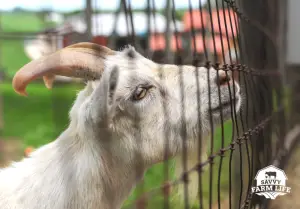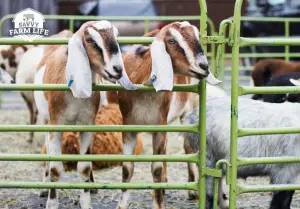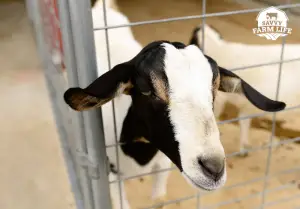Best Types of Fencing For Goats
Goats are known for their stubborn, yet curious personalities, meaning they have no problem pushing the limits of their enclosure. It is well known in the farming community that goats will inevitably break whatever kind of “fool-proof” fencing strategy you come up with much sooner than expected.
According to one blogger, “If water can get through your fence, then so can a goat.” Goats will scratch, jump over, and stand on top of your fencing in a true test of its durability. So, you might be wondering, if goats are so harsh on their fences, what is the best type of fencing for goats?
Depending on your budget, the number of goats on your farm, the area you’re trying to contain, and your thoughts on electric fencing, there are plenty of great fencing options that will protect your goats and keep them contained. The most popular options are woven wire fencing, cattle panels, and electric fencing.
In this article, I’ll discuss the positives and negatives to each popular type of goat fencing, as well as go over some particular kinds of fencing that should be avoided at all costs. Buckle up, as there’s going to be a lot of important information on how to properly contain your goats!
Things To Consider Before Purchasing Goat Fencing
As with any farm animal product, there are many different types of fencing that can be used to hold in your goats. Your decision should really come down to how much you’re willing to spend on goat fencing. Bear in mind, that cheaper fencing usually needs to be replaced more often than expensive fencing, leading to the possibility of higher costs in the long term.
What kind of fencing you purchase for your goats will also be impacted by the amount of space you’re trying to enclose and the size of your herd. For bigger areas that cover a wider range of terrain, fencing options that are easier to install will be more ideal.
The breed of your goat also impacts the fencing that you will need to purchase. Some goats, like the Pygmy and Nigerian Dwarf goat, can jump very high due to their smaller stature and nimble bodies. If you’re trying to contain these goats, you’ll want to prioritize fencing that is tall in height, aka between four and five feet.
If you’ve tried a variety of different fencing options, but nothing seems to hold your herd, then it might be time to consider attaching electric wires to your fence. Goats are intelligent creatures who will learn very quickly that electric zaps are not fun and to stay away from the electric fence.
Lastly, goats will often scratch against their fencing or stick their heads through its holes. This is why it’s important to purchase fencing with holes 4”x4” or less. This will hopefully help minimize the chances of your goat getting its head or horns stuck in the fencing; which would be an unpleasant experience for both you and your goat involved.
Types of Goat Fencing
Alrighty, so now that we’ve gone over the basic requirements that your goat fencing must meet in order to work effectively, let’s discuss the various fencing options that are on the market. I’ll be going over the pros and cons of each, as well as giving you a general idea of pricing.
Woven Wire Goat Fencing 
First on the list is the woven wire fencing. This is a sturdy, popular choice for farmers looking to protect and contain their herd of goats due to its bindings. The wire is attached to form squares in the fencing, and the points at which the wire crosses itself are tightly bound together by a wire weave. Hence, the name woven wire.
Pros
The wire that is bound over itself via wrappings provides a tightly-knit connection that will not easily be broken by adventurous goats. It is typically a very durable choice for goat fencing that, when installed close to the ground and measuring at an adequate height, will contain a rowdy herd.
Cons
Due to its natural strength, woven wire is often more expensive than other options. The Red Brand woven wire fencing is a popular choice amongst farmers, but it costs about $350 for 330 feet of fencing. If you’re looking to enclose a large area, woven wire is not only going to be an expensive choice, but also a laborious installation.
The wire’s flexibility means that it will bend and hold its shape against a pack of curious goats, but it also means that the installation process requires careful precision. You must install your fencing in a smooth, stable way without any gaps for the goats to escape through. With time and practice, though, you should be able to nail this fencing down relatively easily.
Cattle Panels Goat Fencing 
Cattle panels are another popular choice amongst goat owners looking to hold their herd. There are also special goat and sheep panels, but these do not measure as high as cattle panels do, making it easier for goats to escape.
Pros
Cattle panels are heavy-duty rows of steel wire that flex and bend with outside pressure, but not as much as the woven wire does. This means that it holds its shape better in the face of mischievous goats; successfully thwarting any escape attempts.
It is also relatively easy to install because it comes pre-assembled. Pretty much all you have to do is nail it into the ground tightly and ensure that it is high enough to discourage goats from jumping over. At $30 for 16ft of paneling, it can be more cost-effective than woven wire as well, depending on the area you’re trying to enclose.
Cons
Cattle panels can sometimes have holes that are larger than 4”x4”, causing goats to get their heads or horns uncomfortably stuck. When this happens, the goat might panic and hurt themselves by struggling against the steel. This can be easily avoided by simply buying a type of cattle panel that features small holes, however.
Another downside to cattle paneling is that it usually only comes in 16ft increments. Due to the steel composition, these panels cannot be bent or folded for easier transportation. In order to transport them to your farm, you’ll need to pay for special shipping from an online retailer or rent a large enough truck to tow the panels.
Electric Fencing Goat Fencing
There are many different kinds of electric fencing that can be used to effectively train rowdy goats to stay in their enclosure. For example, you can purchase individual electric wires and attach them to a singular portion of your fence, or you can purchase a fence that is entirely electrified (though this is oftentimes unnecessary if you’re just trying to hold goats).
Pros
Goats are fast learners, so installing even a singular electric wire at the top of your fence will teach them very quickly not to jump over it. Electric wires are best used as a last resort for containing extremely unruly goats.
Cons
Electric fencing is not cheap and often has to be purchased in conjunction with another kind of fencing for maximum containment. Depending on the brand that you decide on, electric fencing can run you anywhere between $100 and $200, so definitely take the time to research before deciding to purchase.
In addition to this, electric fencing can be dangerous if you have young kids on your farm. They might accidentally bump into the netting and injure themselves, so the age of your farm occupants is definitely something to consider before purchasing this kind of fencing.
Worst Types of Goat Fencing
Now that we’ve covered the most popular choices for containing your goats, let’s go over some of the least effective fencing options so you understand what kind of fencing to avoid.
Barbed Wire Goat Fencing
Barbed wire may seem like an attractive fencing option at first; it keeps the goats in check and doesn’t require the same maintenance that an electric fencing system does. However, barbed wire can severely injure your goats.
As I’ve mentioned previously, goats are extremely curious animals who like to push the limits of their fencing. They will jump over, butt into, and, generally speaking, do everything they can to destroy your hard-built fencing.
With barbed wire fencing, you run the risk of a goat catching themselves on the barbs and panicking when they realize they are stuck. This can lead to further injuries, such as them accidentally shredding their ears or heads on the sharp ends of the fence.
My advice is to simply avoid barbed wire fencing at all costs, especially if your farm contains a herd of curious goats.
Welded Wire Fencing for Goats
Welded wire fencing looks very similar to woven wire fencing to the untrained eye, so it’s important to understand the structural differences between these two kinds of fencing.
Like woven wire fencing, welded wire fencing features the intersection of two wires to form squared-mesh fencing. However, instead of being woven together at these intersections, the wire is lightly fused together via a welder, theoretically melting the two bits of wire together.
This type of connection is not as durable as woven wire connections and can easily be broken under the stress of a goat’s weight. This type of fence may seem attractive at first due to its lower price than other types of fences, but, over time, with the constant repairs it requires, will break and end up costing you more than the initial purchase of a durable fence would have.

